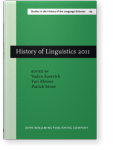Earlier and later anti-psychologism in linguistics
Psychologism has been a mainstream view in linguistics throughout many centuries. Serious and prominent anti-psychologism flourished in the first half of the 20th century, mainly in European structuralism. As a minority view, mostly dubbed ‘anti-mentalism’, anti-psychologism resurfaced in the 1970s in reaction to Chomsky’s strong psychologism. I will show that, in spite of differences due to their relationship to divergent problem contexts, the earlier and later varieties of anti-psychologism share as a common kernel a full recognition of the intentional character of language. However, the locus of intentionality differs between the two.
